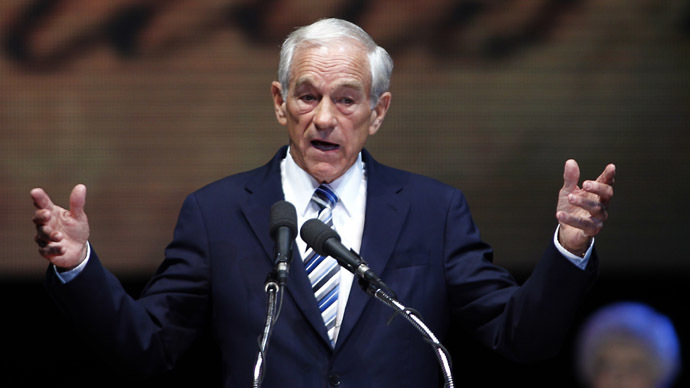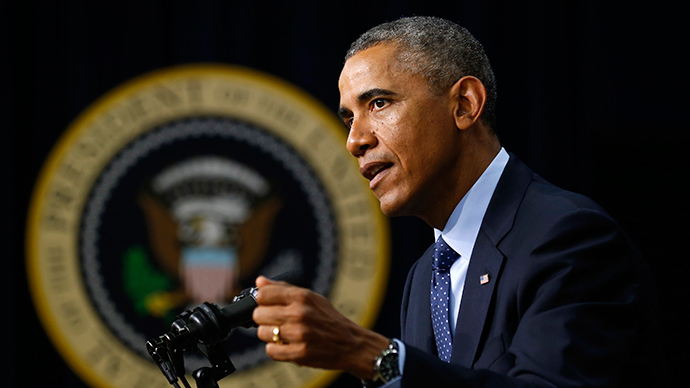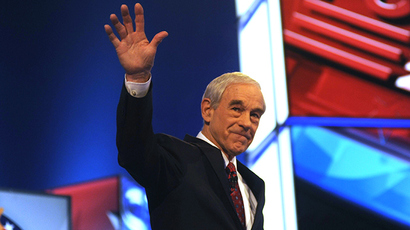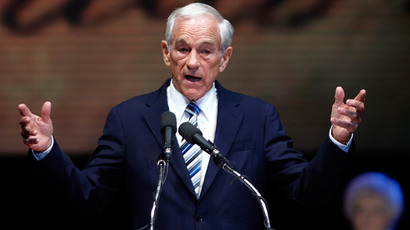Ron Paul: Ebola concern 'way overblown'

Concern over the spread of the Ebola virus in the United States is “way overblown” right now thanks to panic induced by mainstream media and the federal government, according to former Republican congressman and three-time presidential candidate Ron Paul.
Paul, known for his conservative libertarian stances against many forms of government intervention, said during an interview with Larry King's 'Politicking,' which airs on RT America, that while Ebola is serious, he is “concerned about the hysterical reaction we’re getting.”
“I think it’s important, but I think it’s way overblown. In comparison to other things, I think there are some other medical things that we ought to worry about,” Paul said, adding that Tuberculosis and HIV, to name two examples, are still very serious illnesses that are much more common than Ebola.
Asked to speak on US Centers for Disease Control and Prevention head Thomas Frieden’s comment that Ebola is the worst public health crisis since AIDs, Paul said any comparison between the two is “premature.”
“If he thinks [the latest Ebola outbreak] is as serious as AIDS, maybe, maybe someday we might look back and see it,” he said. “But right now, I don’t think it comes anywhere close. [AIDS] is a pandemic. [The US is] still losing 15,000 a year [to AIDS], and it’s really controllable if people understand the way AIDS is spread.”
Paul said the Obama’s administration’s decision to send thousands of US military troops to West Africa, the epicenter of the Ebola outbreak, was an odd but typical way for the US to address a medical crisis.
“We’re such a militant country. We get ourselves into all kinds of troubles economically and on foreign policy. And always the answer is military, military, and drop some bombs,” he said. “If anything, it could increase the chance of [Ebola] being spread.”

Paul lamented the hysteria over Ebola especially prevalent on cable news networks in the US.
“Right now, I think the panic is much more dangerous and will cause more harm than the disease itself.”
The former congressman added that government regulatory structures in the US have impeded the pharmaceutical industry’s progress in developing drugs to combat Ebola.
“In many ways, the government obstructs and prevents these things from happening, and I resent that somebody who is dying from cancer or an infection has to get bureaucratic permission from the government to say, ‘Yeah, I want to take a risk,’” he said. “That should be between the doctor and patient.”
Paul, a non-interventionist regarding American foreign policy, said President Barack Obama has handled “poorly” the rise of militant group Islamic State (also known as ISIS or ISIL), which, after fighting to control large swaths of Syria and Iraq, is now the target of US-led airstrikes.
“Bombing seven Muslim countries doesn’t win friends and influence people,” he said of US strikes in Pakistan, Yemen, Libya, Iraq, Syria, Afghanistan, and Somalia during Obama's time in the White House. “That tends to get people pretty angry at us.”

“The growth of ISIS is the reflection of a deeply-flawed foreign policy,” Paul added. “And then when we see this violence, all we can do … is send more troops and drop more bombs and they don’t realize that that has something to do with the spread of the radicals, because the radicals aren’t happy with the government we put in place in Iraq. What a stupid policy and a stupid war. There was no Al-Qaeda in Iraq. So we’ve been participating in these conditions. We have given fodder to those people who want to build the ranks. And the more we do the bigger the ranks get. To me, it’s not a shocking surprise to find out that ISIS is doing well.”
Paul said that rather than continue to compound on past mistakes, he would pull out of the region.
“I’d come home as soon as possible because it’s a very serious problem over there, and I think we just muddy the waters,” he said. “I would do what Ronald Reagan did when the Marines got killed in Lebanon. He said he did not realize how irrational the people in that region were, and that if we had followed a non-interventionist policy, the Marines would still be alive. But he said he didn’t know it was so bad. If he had known about the conditions of the politics of that region, he [would have] never sent the Marines in.”
“Throwing in more bombs and killing more people makes no sense whatsoever,” he added.
King asked Paul about a recent poll that found 72 percent of Americans believe the US will send ground troops to fight Islamic State.
“Right now, the war propagandists are winning,” Paul responded.
“If you look at the major networks, if you look at everything the government says, if you look at two political parties, who is really resisting it? It has to do with the way they have played this recent violence of ISIS. This is emotional, but you don’t get a fair shake from the media, because the war propagandists are in charge.”

Islamic State, Paul admitted, is “very dangerous” but is
only “a threat because we keep aggravating" the
region.
Paul compared the rise of Islamic State following the US occupation of Iraq to the ascent of Al-Qaeda and the Taliban after the United States boosted mujahedeen fighters during the Soviet occupation of Afghanistan in the 1980s.
"We’re giving them incentive to get more members constantly,” he said.
On political gridlock in Washington, Paul said that while there is friction between the two parties given the dismal financial state of the US, Republicans and Democrats are actually too bipartisan when it comes to refusing accountability for the Federal Reserve and in advocating an interventionist foreign policy.
He said if elected president, former Secretary of State Hillary Clinton wouldn’t represent “any change in a positive sense.”














